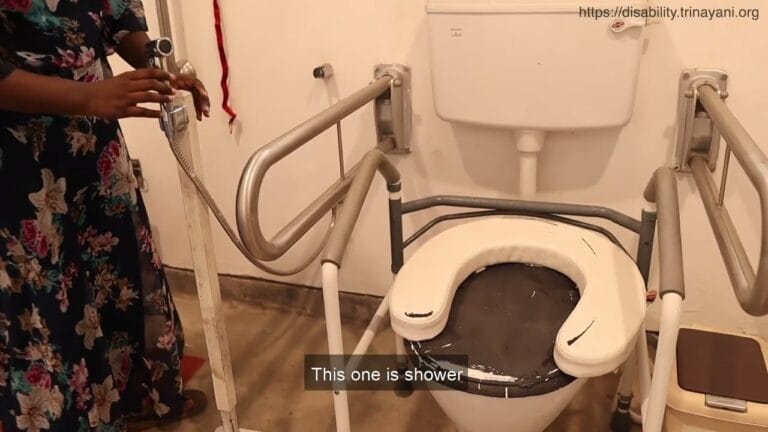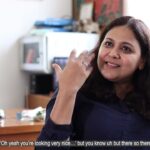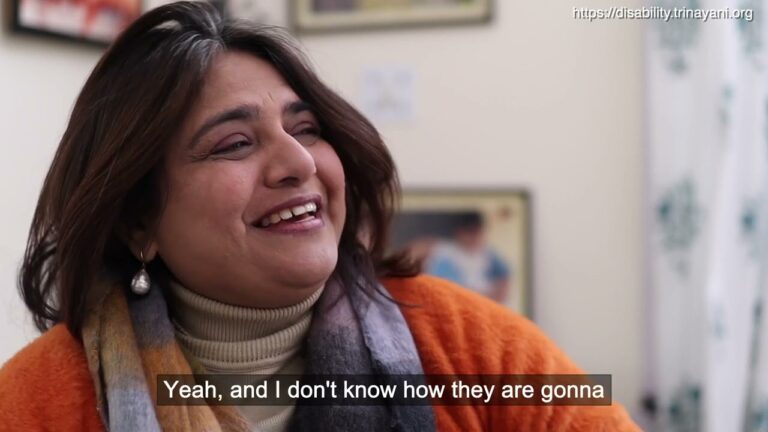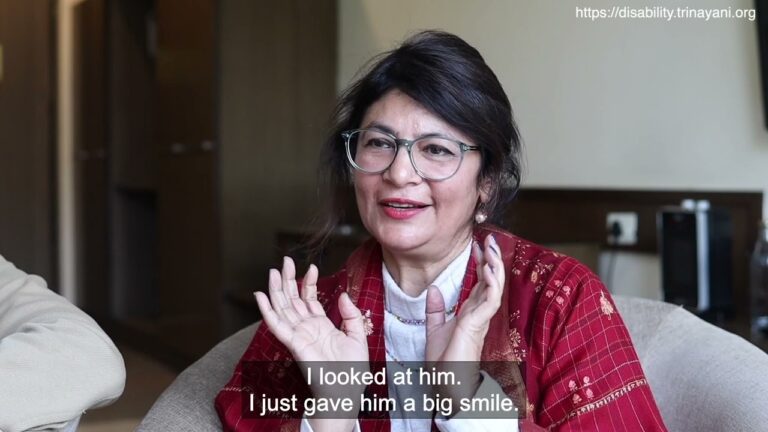Better Chances – Mental Health Facility – Porkodi Palaniappan
This film, featuring Porkodi Palaniappan, explores her vision for Better Chances, a mental wellness center in Chennai that shifts away from traditional, medically driven mental health approaches. The center promotes a more holistic, non-custodial model where people are encouraged to focus on their strengths and well-being rather than their diagnoses. The film delves into the importance of choice, self-discovery and creating an inclusive environment for people with mental health challenges.
Through the night or just couple of hours…
Conventional approaches in mental health, it has always been um uh very medical in nature
and when it comes to in-house treatments, it is still very custodial in nature, you know
So, there is not much of uhm freedom or independence or choices that are given to the person who is suffering.
So, it is pretty straight jacketed programs that are available.
And that, I believe, adds on to the stress of the person who is undergoing the issue, already.
So uh after having spent a lot of time in the mental health sector with various programs
which um directly or indirectly remains still very custodial in nature.
I think I became very tired of it at one point and I wanted to do something which is not custodial in nature, which does not restrict movement of people and which is also very choice uh based and which allows people to express what they want, what they need and
and be able to live a very uh dignified life like any one of us.
10 years ago, we created uh I created Better Chances in Chennai
and um we call it the Wellness Center
So, we kind of redefined mental health in our own way, you know
and with what we are going to deliver to the peoplewbased on how we want to be treated, you know
And so, we call this a Mental Wellness Center
So, what is the difference then between other services and us?
That would be in in a conventional service in mental health,
um they would put the diagnosis of the person in the center
and they will work around uh that diagnosis
and they would call it the multidisciplinary approach.
So, there will be a social worker, a psychologist, an occupational therapist, whoever.
But they’ll all be working around schizophrenia, bipolar disorder and the diagnosis is the highlight, right.
But in our Center uh though we,
when they come in of course they talk to us about how they have been diagnosed
and what has been uh told to them about the diagnosis and everything,
though we do hear them say all that,
Our question to them would be, so what do you do well, you know.
What are the things that you are capable of doing?
And that would actually take them by surprise because
they are all filled with what they are not capable of
They’ve been told enough about what they are not capable of
When you ask them what they are good at,
It takes a little time for them to touch base with how good they were in certain things.
It could even be something like I can make the best tea in the world,
it could be like I’m a very good cook
And at some point, somebody has said I’m a great cook
It could be uh it could be so many things that we would say are very small, petty things that can be dismissed
but for us those are the most we catch on those things
And we say okay so you’re good at this, do you think we can build on it?
So, what we do is, we put the wellness of the person in the middle
and the same multidisciplinary approach, we do it around the wellness of that person
However, this multidisciplinary approach, we don’t really require professionals to come and do it
We use the community people, the community local resources and the family members,
and all these people.
One or two professionals if they are involved within the program, otherwise, it is pretty much uh within the community, with all the community resources
and we focus on the wellness of the person and we work around that.
So, it becomes like a life experience for the person
and not necessarily in a hospital, looked at by many professionals
and uh you know uh pointed out on what the challenges are, difficulties are, etc.
But here, it is more of a life experience for them
So it is learning, you know
Okay I’m doing this wrong, probably I can uh discuss it with this person
and probably find out how else I can do
And so, it becomes a life journey for them and they progress from there
And what I have uh experienced in both these scenarios is the time taken to recover
Uh I don’t believe in the word recovery itself, first of all, I’m more of a healing type of person
But for someone to actually get out of this issue, you know, even to a certain extent
within the conventional framework it takes a longer period
Whereas within this setup that I’m talking about, the wellness paradigm,
it is much faster for them to feel good
because this so-called recovery is all about feeling good about oneself also
such a way that you are even acceptable to other people
So, once you start feeling good in your own skin and acceptable
and you are moving around with people with acceptance
them accepting you also, then what more do we need right
So, I feel this journey for most of them
even if they are coming out of these mental hospitals with the huge stigma and all of that also
their reintegration back into the community has been much smoother and faster over here.
What I realize is uh when you bring someone from the hospital out, right
um you can bring them, you can take them out of the hospital easily
but it is very difficult to take the hospital out of them
So, what is challenging is the idea that you are sick, that you have a very bad illness
that you have uh uh being incarcerated inside the hospital without much movement also
So, it could be really bad to me and the loss of confidence, identity, your capacities,
everything has been so diminished by that one diagnosis itself
So, it’s very difficult for them to get that out of the system
and realize that hey I can be good in something, you know
So, our process is difficult that way but as we progress in that,
we feel that the person is already feeling good
And all they have to do is unlearn whatever has been told to them
and so, we keep it with their choices also
So if they feel the medicines are giving me relief and I feel better with medication
then we uh ask them to continue that, you know
and that would be a fair thing for them to do.
The the group that comes in here on an everyday basis, they are the pure support group
and we are here for each other
and any ups and downs that we uh undergo in life
Like all of us have those ups and downs,
we don’t hesitate to discuss it with the other person.
So sometimes it’s always in a group also,
where we talk about it loudly uh and say I’m having this challenge
and there are there there are people who say like my
my my mother is treating me like a slave
and I want an independent life for myself and all.
and we cannot sit in a hierarchy position and say no you should not feel like that and all
like, who are we to say that?
So, it is the peer group that addresses
because people have undergone these difficulties
and they address it with each other and
and in that way, the it’s a very equal setting
And it is not difficult to accept what a friend is telling, suggesting to you
So, um so that’s the peer group work also that happens here.
This is no home, this is not where you can come and leave someone and go
This is some place where we empower them to live independently
and then they get curious and ask, what you do and all of that
so that’s how we uh kind of get uh people coming here.
But most of our referrals are from these institutions, these homes that are run all over.
You know like places like Scarf, Schizophrenia Research Foundation
then we have places like The Institute of Mental Health, the government run mental hospital also.
Where people once they have recovered, they recovered or they have shown some progress
uh they are shifted to a hostel kind of facility,
they are still attached to the mental hospital though
And then from there we nego – we talk to the mental hospital and then we try to get them
and that’s how more people are coming in.
The paradigm that we have set for Better Chances is that
we work on the mental, physical and spiritual planes, this is the paradigm
So of course, mental is their, the capacities
We are looking specifically at their capacities
and that’s why the wellness center and all that.
Physical, we really give a lot of importance on their diet their exercise
and um it’s not just about, uh it’s definitely not only about medicine or anything
It’s about a lot of stuff to do with the physical body itself
because we find the mind body connection is very important.
And spiritual is not at all religious, it is about them questioning who they are,
and what they would like to contribute
to themselves and to the larger world and all.
So, finding that purpose for themselves, that is the paradigm.
And we have stuck to a few modalities when it comes to delivering our services
So the first thing is, in order to bring people out, you know
Our purpose is to build on their capacities more, you know
Uh build on whatever they already have and a little bit more on that
so that they can use that capacity to survive in this world.
So, we work on skill building, training and employment
So, uh so skill building, training and then when it comes to employment,
earning a substantial amount of money which will help them live independently.
And the second one is pure support,
to have a solid support of people who undergone similar situations
or friends who are able to understand that situation
and not they need not be necessarily uh professionals
it can be people from the community
the the elderly woman in the next door
it could be a vendor outside.
But somebody who is more empathetic to the situation they are in
knowing that they come from the mental hospital and not stigmatizing them,
and willing to accept them in whatever condition they are,
and not afraid of them, etc.
So, so the peer support is a very strong component of our modality.
And the third one is creating inclusive community
So, in this process we enable them to live in the community
So, um so then what happens is uh uh we find homes for them in the community
and the community already knows them
So there is no hesitation in giving these homes
Now that is a big barrier that we’ve managed to break
because uh the stigma around uh people with mental health disabilities getting a home,
we still face that with outsiders
But in this area, we are creating a sensitive community
which will give their homes for rent for these people
knowing very well that they have a mental health problem
and knowing very well that they could be ups and downs.
And this is one of the most forthcoming communities I have worked in
where the acceptance level is really very high.
And we have uh uh managed to integrate about six people into the community.
And there have been a lot of problems,
it’s not always smooth sailing
There have been issues where um uh clients have pushed flower pots from the terrace to the ground
and and you know the community would immediately call me
and I would come rushing here and we would all sit and have a meeting
and they would gently uh um I mean
they would have their own apprehensions as to why they did that
and uh I would also have my own apprehension
But then, they would sit and talk to the girl
and say, uh see there are kids playing downstairs
and if something falls on their head, you know
And when they talk like that, the the person is able to understand that
and it is never repeated again.
So, it’s not like everything is smooth sailing
There are challenges but the community does not stigmatize them
Instead, it tries to understand and sit with me
and tell them how we can handle it better.
So, I feel the community is full of social workers in our project, you know.
In Ms Porkodi’s words,
“Mental health should be owned by everybody. The nearest person should be able to step up, without differentiating and judging. Gradually the community should also accept and support. That’s why we have to create more and more awareness.”
alternative treatment, capacity building, choice-based care, community integration, dignity, empowerment, holistic approach, inclusive communities, independence, mental health, mental wellness, non-custodial care, peer support, person-centered care, recovery, rehabilitation, skills building, stigma reduction, therapeutic community, wellness paradigm
Dive Deeper: More on Disability
Learn about the most common inquiries surrounding disability, education, legislation, accessibility, employment and other sectors related to disability.


Playlist
Access & Inclusion


Playlist
Adaptive Sports


Playlist
Alternative Communication Methods


Playlist
Autism & Neurodiversity


Playlist
Blindness & Adaptations


Playlist






